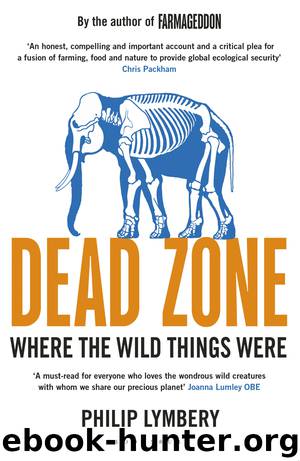Dead Zone by Philip Lymbery

Author:Philip Lymbery
Language: eng
Format: epub
Publisher: Bloomsbury Publishing
Published: 2017-08-10T16:00:00+00:00
12
Penguin
NO MORE FISH IN THE SEA
Robben Island, South Africa, where Nelson Mandela was held captive for eighteen years, had a long and sombre history, as a prison, a place of exile for social outcasts, and a military base, before becoming a World Heritage Site and monument to the dark days of apartheid.
Sited some 7 kilometres west of Cape Town, it lies in a perilous stretch of the Atlantic for seafarers. Many a ship has been dashed on its reefs, the wreckage shattered and consumed by the sea as it pounds against the rocky shores. One casualty was a seventeenth-century Dutch vessel laden with gold coins meant for the salaries of workers from the Dutch East India Company. Today, the treasure would be worth tens of millions of pounds, but it was soon swallowed up by the waves, leaving only a handful of gold coins to be discovered by fortune hunters.
The word ‘Robben’ is Dutch for ‘seal’, but on 23 June 2000 it was another species that faced grave peril when a Panamanian cargo ship transporting 140,000 tonnes of iron ore from China to Brazil became the latest victim of the unforgiving waters.
When MV Treasure sank after developing a hole in her hull, she disgorged tonnes of oil into the sea, creating an environmental catastrophe that threatened an already endangered colony of African penguins on Robben Island and neighbouring Dassen Island. The disaster could not have come at a worse time for the birds, who were in the throes of a breeding season, and were busy catching fish for their offspring when they became engulfed in the sticky slick.
As the oil spread, the stricken birds began assembling on the shores, just a few at first, then hundreds, then thousands. They stood shoulder to shoulder, black and bedraggled, hunched like miserable, dishevelled crows. These were the lucky ones: others did not make it to shore fast enough, and succumbed to hypothermia or drowning. The future of the African penguin, once the most common seabird in these parts, now hung by a thread. A hundred years ago, their numbers stood at 3 to 4 million. By the time the disaster struck, their ranks had already been depleted to some 170,000.
The tragedy triggered one of the world’s greatest wildlife rescue operations. As news of the crisis spread, penguin specialists from all over the world headed to South Africa to join a 12,000-strong army of volunteers in a race against time to save lives.
Over 16,000 oiled birds were corralled, captured, boxed up, trucked, ferried and even flown by army helicopter to the mainland for treatment. The oiled birds were gathered in a massive disused train-repair shed in Cape Town, where they were fed and scrubbed clean by willing hands armed with toothbrushes and washing-up liquid. Thousands of traumatised penguins stood in stunned silence as the volunteers laboured amid an overpowering stench of excrement, oil, fish and human sweat.1
Nearly 20,000 birds were saved before they became oiled, but rescuers faced a dilemma: what to do with them.
Download
This site does not store any files on its server. We only index and link to content provided by other sites. Please contact the content providers to delete copyright contents if any and email us, we'll remove relevant links or contents immediately.
Sapiens: A Brief History of Humankind by Yuval Noah Harari(14358)
The Tidewater Tales by John Barth(12644)
Mastermind: How to Think Like Sherlock Holmes by Maria Konnikova(7313)
Do No Harm Stories of Life, Death and Brain Surgery by Henry Marsh(6931)
The Thirst by Nesbo Jo(6921)
Why We Sleep: Unlocking the Power of Sleep and Dreams by Matthew Walker(6693)
Life 3.0: Being Human in the Age of Artificial Intelligence by Tegmark Max(5541)
Sapiens by Yuval Noah Harari(5363)
The Body: A Guide for Occupants by Bill Bryson(5072)
The Longevity Diet by Valter Longo(5057)
The Rules Do Not Apply by Ariel Levy(4953)
The Immortal Life of Henrietta Lacks by Rebecca Skloot(4571)
Animal Frequency by Melissa Alvarez(4457)
Why We Sleep by Matthew Walker(4429)
The Hacking of the American Mind by Robert H. Lustig(4368)
Yoga Anatomy by Kaminoff Leslie(4353)
All Creatures Great and Small by James Herriot(4303)
Double Down (Diary of a Wimpy Kid Book 11) by Jeff Kinney(4257)
Embedded Programming with Modern C++ Cookbook by Igor Viarheichyk(4169)
